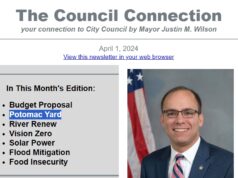A certain mendacity in politics is not unheard of, but a new way to prevaricate without overtly lying seems to be showing up in the financial reports of some candidates for, of all things, Fairfax County School Board. We are all familiar with the way fund raising goes into high gear toward the end of a reporting period, when candidates plead for cash “to show the opponent we are serious,” and then by publishing how much money they have raised. Journalists frequently gauge a candidate’s viability, even predicting winners and losers, based on their fund-raising prowess.
Virginia’s campaign finance law places no limit on the amount of political contributions, but requires “transparency” in reporting donations, so that the voting public knows who (or what) is funding a candidate, the theory being that if you know who is paying, then you can figure out to whom the candidate will be beholden. Candidates are required to report not only cash donations but the value of so-called “in kind” donations, which can cover any goods or services given to candidates to help in their campaigns. Here is where savvy politicians have figured out a way to game the system. How? By inflating the value of in-kind donations, and even by claiming phantom invoices for services, like that of campaign treasurer, which are in fact voluntary and unpaid. These bogus big figures then puff up the “total cash raised,” making the candidate look far more impressive than he or she may be in reality.
There are no bad consequences for such false reporting, not even tax consequences, because there are no taxes paid on campaign income, and there is no way at present to audit the real value of in-kind contributions. Instead, some politicians see benefits. When some candidates dial for dollars (real dollars) from donors, they point with pride to the money they have already raised, encouraging further donations to keep up their momentum, but they do not reveal how big a chunk of what they’ve reported is not cold hard cash. They may be reporting, say, an in-kind donation of $6,000 for “political consulting” when the normal fee is more like $1,000 or at most $1,500; or claiming a $1,300 value for what is in fact a $200 ad in a football program; or valuing the services of a campaign treasurer at $4,000 a month when the treasurer is normally not paid, but is a volunteer; it is difficult to imagine the treasurer of a school board campaign is worth $48,000 a year, even if he happens to be a CPA.
When journalists check out the financial reports of candidates and issue their pundit-analyses of the election, they do not trouble themselves by digging into just how real the reported contributions are. In the Fairfax County School Board race, as of 19 September, for example, Mancheno-Smoak, endorsed by the Fairfax Republican Party, reported receipts of approximately $72,988, way ahead of most candidates (like Epstein, $48,233; Shultz, $27,524; Stuban, $20,797; Brown-Kaplan, $13,749). But 48.85 percent, almost half, of Mancheno-Smoak’s stash was in-kind donations, mostly from Catherine Lorenze whose Red Apple Mom outfit does communications and campaign strategy for Republican candidates; another 34.25 percent was a $25,000 loan from her husband, meaning that actual cash donations from the public were less than 20 percent of the otherwise impressive-sounding total. According to knowledgeable sources on the campaign trail, Mancheno-Smoak is a prime example of how candidates can artificially inflate the value of in-kind contributions—- although Shultz also admitted that 55.5 percent of his $27,524 was in-kind, and Epstein showed 42.81 percent of his $48,233 as being in-kind, which raises similar questions about possible over-valuation.
Why do politicians feel obliged to employ this rather questionable bookkeeping? To begin with, the cost of even school board elections has escalated enormously, especially in Fairfax County. Megan McLaughlin, running for the School Board’s Braddock District seat, quoted in the Fairfax Times said “…I went to the Virginia Board of Elections to find out what the expenses were of the 2007 election. For a district seat, it looks like minimally the candidates have to raise $15,000,” but that in 2007 each candidate for the Braddock seat actually spent “$40,000-plus during the election.” The same article quoted Llyrong Moon as saying in 2007 he raised nearly $100,000 to run as at-large candidate against seven others seeking the three at-large seats. This year the school board races are more intense than in the past, but Moon said that campaign contributors’ pockets are not as deep as they were before the recession, making it harder to raise the money needed. Therefore, those candidates who can show they have raised a hefty amount of money will be perceived as the most likely to win, and, therefore, will indeed be the most likely to win.
If all this seems a bit over the top for what are local, small-bore elections (although schools are a subject dear to the heart of every parent, indeed, of most residents of Fairfax), then what is the ultimate purpose of engaging in such kabuki theatre, doing whatever it takes to win, win, win, especially in what purports to be a non-partisan race? According to an article in The Connection in School Board elections “no one has been elected without backing from one of the major political parties.” Fairfax County Public Schools are big, the 11th largest school district in the country, with a $2.2 billion budget, which, says The Connection, is larger than the education budget of nearly 15 states,” and forms about “52.5 percent of total county disbursements.” Sitting on the School Board, in other words, is excellent training for higher elected office. It is fair to say, as does Toni-Michelle Travis, a professor of U.S. and Virginia government at George Mason University, in the Fairfax Times article, that elections to the Fairfax School Board are “highly partisan… and they also set the stage for how the next elections will go… who will seek higher [local or state] office.”
The School Board is the nursery where the Democratic and Republican Parties raise and groom future candidates for bigger things. “You step up. You start on school board. Then you run for county board, then maybe statehouse…” said Travis. That is why the increasingly partisan campaigns for school board, now being run by professional consultants, find it necessary to puff up the candidates by faking the size of their warchests. It is a kind of psychological warfare stunt to intimidate opponents and garner favorable publicity. Who knows, if you can get your candidate elected to the school board, you may have launched the career of a future Attorney General or Governor. Note to prospective donors: the next time a candidate calls you for a contribution, ask him or her how much they have reported as receipts, and how much of that is actually in-kind contributions.


 Sign up for the Blue Virginia weekly newsletter
Sign up for the Blue Virginia weekly newsletter








![Sen. Mark Warner: “The best time to [pass aid to Ukraine] would have been months ago. The second best time is right now.”](https://bluevirginia.us/wp-content/uploads/2023/02/warner0207-100x75.jpg)